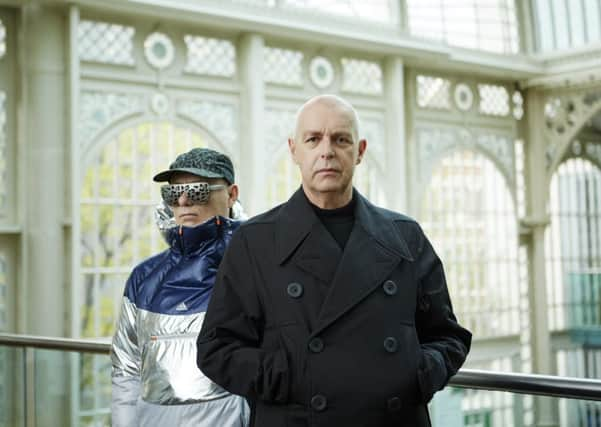Album reviews: Pet Shop Boys | The Last Shadow Puppets | Trembling Bells | Update4


Almost exactly 30 years on from the release of their debut album Please, the Pet Shop Boys remain in rude health – elder electro pop statesmen who comfortably straddle the mainstream and more left-of-centre art realms. Their latest live extravaganza will debut at the Royal Opera House this summer; in the meantime, their thirteenth album, Super, maintains the upbeat commercial synth pop momentum of its predecessor Electric.
Super (***) is consistently club-friendly, but elegant with it, its content divided pretty evenly between dancefloor bangers shaped around a repetitive vocal hook and more enigmatic observational songs, capturing a time and place. In the former category, a succession of one word titles cut to the chase. Happiness sets the propulsive party tone, Groovy celebrates/satirises the self-obsession of clubland poseurs while Pazzo!, meaning “crazy”, continues the duo’s love affair with Italian lingo.
Advertisement
Hide AdAdvertisement
Hide AdInner Sanctum is a sleek trance track with an ambivalent attitude to VIP club culture, while Undertow examines fatal attraction on the dancefloor, but the nightlife theme runs to more sophisticated commentary on The Pop Kids, a character study of a couple lost in the live music scene, which ends abruptly and ambiguously on “I love you”, and Twenty-something, a bittersweet snapshot of a time when income doesn’t match aspiration, but the party happens anyway.
Neil Tennant also applies the same detached interest to the limpid Sad Robot World and The Dictator Decides, a wry portrait of a reluctant oppressor (“will someone please tell me I’m wrong”) over an electro baroque backing track. Thirty years on, the Pet Shop Boys remain skilled commentators on the politics of dancing.
From one arch, talented duo to another. The Last Shadow Puppets have less form but plenty of style, being the very occasional outlet for the musical bromance of Arctic Monkeys’ frontman Alex Turner and indie troubadour Miles Kane. Eight years ago, the pair unleashed their inner crooner on a debut album, The Age Of Understatement, steeped in the influence of Bacharach-style easy listening pop and Sixties movie soundtracks and gracefully embellished with sterling string work from former Arcade Fire man Owen Pallett.
Now they have cleared enough space in their diaries for a second album, Everything You’ve Come To Expect (****) – that expectation arguably not extending to the urgent punky rhythm’n’blues of taster single Bad Habits and publicity shots of the pair lounging in their matching velour tracksuits. There are other, meatier, rock moments on display, such as the snarling Used To Be My Girl, but the retro stylings surface again most becomingly on the likes of Dracula Teeth, a feast of twanging acid guitar, swooning string arrangements and seductive vocal melodies, and the stealthy title track, on which Turner tortures himself eloquently and achingly over a former love.
The spur, as before, is mainly girl trouble. The pair are incorrigible musical flirts – Turner, for example, doesn’t hold back on the Roy Orbison heartache meets Elvis swagger of Sweet Dreams, TN. But if you’ve got it, as these two most patently have, then why not flaunt it?
Glasgow’s Trembling Bells are a different throwback proposition but just as bold in their execution of a bygone sound – their inspiration being the crossroads between folk, psychedelia and prog rock which immediately conjures up images of patchouli-scented happenings in the late 1960s.
Mini-album Wide Majestic Aire (****), intended as a companion piece to their 2015 album The Sovereign Self, features seven ancient yet modern folk songs, celebrating the diverse attractions of Bute, Carbeth and Marble Arch in Lavinia Blackwall’s purest, operatically soaring tones. Fiona Shepherd
FOLK: Breabach: Astar | Rating: **** | Breabach Records
Advertisement
Hide AdAdvertisement
Hide AdAstar is Gaelic for a journey, and Breabach have certainly gone the distance over the years to return with some intriguing cross-cultural cargo, as this expansively produced album demonstrates. Hence a haka from Maori guest Scott Morrison hollers in dramatic counterpoint to pipes and fiddles in the Muriwai set, while The White Sands of Jervis Bay generates a dreamtime soundscape of didgeridoo, shimmering strings and the incantations of Australian Aboriginal singer Yirrmal Marika, before giving way to Gaelic song.
Heading north, Hardanger fiddler Olav Luksengård adds grainy strings to Megan Henderson and Ewan Robertson’s warm-hearted singing of Dick Gaughan’s Outlaws and Dreamers, while Olivier Demers of the Quebecois band Le Vent du Nord contributes the titular “happy feet” to the brisk set Les Pieds Joyeux.
Robertson delivers Ribbon of Fire, a fine song bringing a reconciliatory note to the all-too-familiar theme of one dispossessed people dispossessing another, while a growl of didgeridoo threads its way through the Cape Breton tune, The Last March. Jim Gilchrist
CLASSICAL: Viri Galilaei: Favourite Anthems from Merton | Rating: **** | Delphian
Oxford’s youngest choral foundation, the Choir of Merton College is spearheading a renaissance in the performing, commissioning and recording of sacred music. This fifth recording for the Delphian label, which contains anthems ranging from the golden age of Tallis and Byrd, through Elgar, Parry and Finzi, to stirring contemporary works by Jonathan Dove and Patrick Gowers, is a potent testament to that. The singing, under joint directors Peter Phillips and Benjamin Nicholas, is wholesome and uplifting. Dove’s Te Deum is substantial and dramatic, stylistically conservative but stylishly crafted. Gowers’ Viri Galilaei is more freely expressive, from its atmospheric opening and close, with shimmering organ chords, to its massive central climax. Well-known classics by Tallis, Rutter, Parry and Harris add to the warmth of this well-stocked anthology. Ken Walton